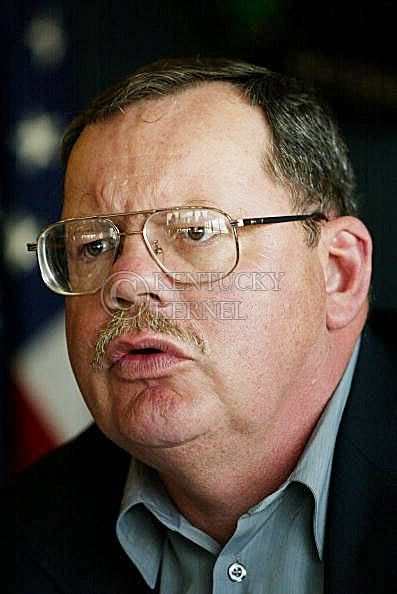Annual celebration recognizes freedoms of the First Amendment

September 21, 2010
The five protections listed in 45 words of the First Amendment are essential to a free society — this was one main message at Monday evening’s annual First Amendment Address.
Terry Anderson, honorary co-chair of the Committee to Protect Journalists and visiting journalism professor at UK, delivered this message as the keynote speaker at the First Amendment Celebration. The Scripps Howard First Amendment Center sponsored the celebration through UK’s School of Journalism and Telecommunications.
Mike Farrell, director of the center, welcomed the crowd of students, faculty and visitors. Farrell said the center hosts this event to celebrate the freedoms Americans enjoy because of the Constitution and the Bill of Rights.
“We celebrate the First Amendment to remind ourselves and others that freedom must be re-guaranteed by every generation,” Farrell said.
In his address, Anderson said the First Amendment is worth fighting for and said Americans are fortunate to have a First Amendment, but they should not take its worth for granted.
“The state of the First Amendment is, as always, parlous, full of uncertainty and even danger,” Anderson said.
“We’re lucky in the United States, people seldom die over the First Amendment,” he said. “Freedom of the press, freedom of speech and religion, the right to assemble and petition. They seldom even go to jail, though it happens now and then, but that doesn’t mean we can be complacent, that we can feel safe in our freedoms.”
Anderson said countries like China, Russia and North Korea guarantee freedom of the press and free speech in their constitutions, but the liberties do not actually extend to their people.
“Words, no matter how elegant, don’t mean anything without action to back them up,” Anderson said.
New technologies have made freedom of speech and press more complicated, Anderson said. More and more media outlets are moving to the Web, and anyone can publish anything, he said.
“We can’t really make a good definition of a journalist,” Anderson said. “And any real attempt to do so means that you are giving someone — the government, the press, the corporations who own most of the media, someone — power to have that the First Amendment was intended to keep anyone from having.”
While serving as the chief Middle East correspondent for the Associated Press in Beirut in 1985, Anderson was kidnapped and held hostage for seven years by Shiite militants. Now, he works with the Committee to Protect Journalists, helping journalists around the world, monitoring and protecting their freedoms.
Monday’s event also honored John Nelson, managing editor of the Advocate-Messenger in Danville, Ky., for his work to promote freedom of the press with the James Madison Award for Service to the First Amendment. Nelson is the fifth person to receive the award.
The award is presented each year to someone with significant ties to Kentucky whose efforts have resulted in the preservation or expansion of freedom of the press and/or freedom of speech, said Judy Clabes, the award’s first recipient.
Clabes said Nelson has fought hard for open government. As president of the Kentucky Press Association in 2004, Nelson led a statewide audit for public record accessibility, Clabes said.
Nelson said the award humbled him, and said he knew what James Madison felt like as a short man, because he must “look up” to the people who have won the award before him.
Al Cross, director of the Institute for Rural Journalism and Community Issues and UK journalism professor, attended the First Amendment Celebration and said it is important that people who advance the cause of the First Amendment receive recognition.
“If we don’t do good work, people are not going to continue to support the First Amendment,” Cross said. “If we do bad work, they’ll be even less inclined to do it.”































































































































































